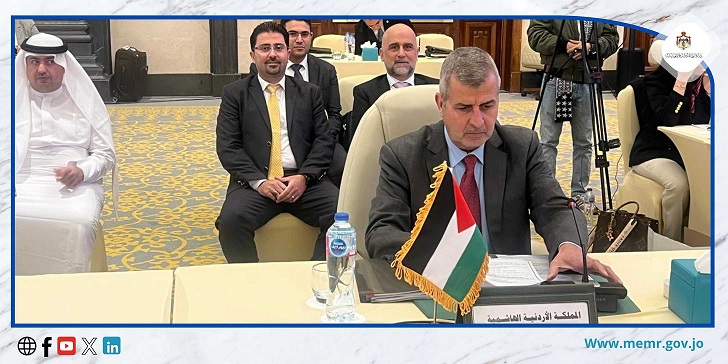Al-Kharabsheh Stresses the Need for Arab Collective Efforts to Achieve Comprehensive Energy Transition
Al-Kharabsheh: Smart Grids and Green Energy Are Top Priorities for Arab Energy Transition
Al-Kharabsheh: Transition to Renewable Energy and Green Hydrogen is the Key to the Region's Energy Future

Photo album
Cairo – December 2, 2024 – The Hashemite Kingdom of Jordan, represented by the Ministry of Energy and Mineral Resources, assumed the presidency of the 15th session of the Arab Ministerial Council for Electricity for 2024. The handover ceremony was held today, Monday, at the League of Arab States in Egypt’s New Administrative Capital in Cairo.
In his inaugural address, Dr. Saleh Al-Kharabsheh, Jordan's Minister of Energy and Mineral Resources, emphasized the importance of the meeting, which takes place at a pivotal stage as the world undergoes a significant transformation in electricity production and consumption. He highlighted the shift from traditional grids to smart grids, regional and international electrical interconnections, and transitioning from fossil fuel-based power generation to renewable energy sources.
Al-Kharabsheh underscored the importance of integrated efforts and the efficient use of natural resources in the Arab region, enabling the region to be part of the global energy transition system and regional interconnection networks.
He noted that there is still much work needed to complete projects and enhance energy exchange through interconnection lines, moving towards the concept of joint electricity markets. This would position Arab nations to connect with global electricity markets, a priority that must be achieved.
He further highlighted that the discussion now extends beyond exporting green electricity, pointing to the region's significant opportunity as a major producer of all forms of green energy, particularly green hydrogen, known as the "fuel of the future." He stressed the importance of using this resource to meet domestic needs first, with the surplus exported to consumer countries aiming to achieve environmental sustainability and energy diversification.
Al-Kharabsheh also shared Jordan’s experience in strengthening electrical interconnection systems with neighboring countries. He mentioned ongoing efforts with Egypt to double energy exchange capacities, collaborations with Iraq and Palestine, and plans for a new electrical interconnection with Saudi Arabia. He expressed hope that these projects would be completed soon, significantly boosting electricity exchange in the region and contributing to the creation of an integrated Arab electricity market.
In terms of energy transition, Al-Kharabsheh noted that Jordan has increased the share of renewable energy (wind and solar) in its electricity mix from less than 1% in 2014 to approximately 27% in 2024. He stated that Jordan aims to exceed 30% by 2030 through initiatives like electric energy storage technologies, including the development of the country’s first pumped-storage hydroelectricity project, with a capacity of 450 MW and seven-hour storage capability. He added that Jordan is working to enhance transmission and distribution networks by introducing smart grid systems and supporting the shift toward electric transportation by providing the necessary infrastructure.
Regarding green hydrogen investments, Al-Kharabsheh explained that Jordan is working to attract investments in this field. A national green hydrogen strategy has been developed, serving as a long-term roadmap for introducing green hydrogen projects to Jordan. Necessary studies have been conducted to develop regulations and frameworks for green hydrogen markets, alongside the formation of a national green hydrogen committee to monitor investments in this industry and address potential challenges.
He also mentioned that Jordan has signed 14 memorandums of understanding and one framework agreement with global and local companies interested in exploring investment opportunities in this sector. Ongoing efforts aim to identify the optimal model for shared infrastructure for these projects in collaboration with an international consultancy and in consultation with potential investors, financiers, and supporting entities to reach solutions that benefit all stakeholders.
The 15th session of the Arab Ministerial Council for Electricity is set to discuss several key topics, including supporting the manufacturing of electrical equipment for generation, transmission, and distribution in Arab countries, prospects for electricity generation, desalination of seawater using nuclear energy, green hydrogen, and energy efficiency, among other important issues aimed at enhancing Arab energy sector integration.